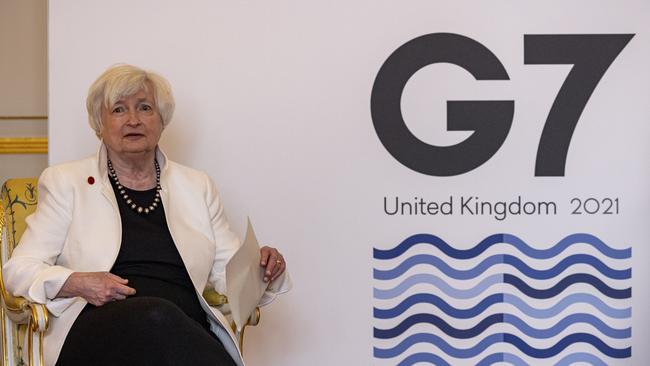
Although many steps lie between those announcements and implementation, there are plenty of reasons to be seriously concerned.
In theory, the changes respond to two separate but interrelated issues. The first arises from digitalisation, which has challenged the traditional framework for allocating the income global companies earn among taxing jurisdictions – a framework largely geared to the location of a company’s operations. By uncoupling where a company has a physical presence from where it earns revenues, digitalisation, it has been claimed, has undermined that framework, depriving countries of taxes they are due.
At the same time, the theory goes, digitalisation has accentuated a global “race to the bottom” in corporate tax rates. As increasingly footloose companies transfer revenue-earning activities to low-tax jurisdictions, such as Ireland or Singapore, the countries they leave behind struggle to meet their fiscal needs.
Whether those claims have much substance is questionable. At least so far, revenues from taxes on corporate incomes have hardly collapsed: having accounted for 3.15 per cent of the advanced economies’ gross domestic product in 2000, they accounted for 3.14 per cent in 2018, with no discernible downward trend in the intervening years.
As for effective average tax rates on corporate income, careful modelling by the OECD shows that from 1994 to 2019 they fell in four advanced economies but increased in six, with the pattern scarcely evidencing a “race to the bottom”. Moreover, where tax rates did decline, the reductions materially boosted innovation, investment and growth, implying that greater pressure to cut company taxes ought to be welcomed rather than deplored.
None of that, however, has prevented progressives from demonising the alleged “race to the bottom”; nor has it stopped cash-strapped finance ministers from devising a “solution” that might well have been lifted straight out of the classic studies George Stocking and his colleagues produced in the 1940s on global cartels.
More specifically, acting exactly as cartels do, the finance ministers have moved to quash the pesky competitors whose conduct they have repeatedly denounced. At the same time, again mimicking standard cartel behaviour, they have ensured that the revenue gain from suppressing competition will be spread widely among the cartel’s members, encouraging even its weaker participants to abide by the rules of the game.
Being almost unprecedented in international tax law (which sometimes involves countries agreeing to maximum tax rates, as on withholding taxes, but rarely, if ever, on minimum rates), the first leg of that two-step approach is anything but straightforward.
Reduced to its simplest, any global company that operates in a country that taxes company income at a rate below (an entirely arbitrary) 15 per cent will automatically be subject to top-up taxes elsewhere, with the right to impose those taxes accruing to the company’s home country and then, if the home country fails to exercise it fully, to the market countries; that is, the countries in which the company makes its sales.
Those supplementary taxes will not only eliminate the tax advantage the low-tax jurisdiction offers – they will also expose the company to high compliance costs, with the difficulties involved in measuring effective tax rates compounding the uncertainties it will face.
While it is unclear how those difficulties will be addressed without significant perverse consequences, the aim is plainly to force low-tax jurisdictions to raise their corporate tax rates, regardless of whether doing so makes any economic sense.
The second leg of the dyad – which spreads the cartel’s benefits among its members – is even more tortuous. Described in the communique as an “equitable solution to the allocation of taxing rights”, it involves a completely new system for taxing the “largest and most profitable multinational enterprises”.
Quite how those enterprises will be defined remains to be determined, as does the list’s sectoral scope; but what the finance ministers have agreed is that once a firm is listed, the right to tax “at least 20 per cent of (that firm’s accounting) profit exceeding a 10 per cent margin” will be allocated to the market countries, with each country receiving a taxing right proportional to its share in sales.
In principle, that shift is meant to be revenue-neutral, with the greater taxes paid in the market countries being absorbed by each listed firm’s home country. The likelihood, however, is that company tax rates will rise in the home countries (to at least offset the revenue loss) and in the market countries too (as they exploit new revenue opportunities).
With the agreement setting tax floors but not tax ceilings, the hikes are sure to be all the greater as the competitive constraint previously imposed by low-tax jurisdictions fades away.
Accompanying the increased rates will be a redistribution of the revenues. In particular, revenues will shift from countries that have created an environment in which profitable companies arise and flourish to those, notably in the EU, that have stifled innovation and entrepreneurship. And China could be a major beneficiary too, obtaining additional taxing rights over foreign entities while sheltering its own firms behind dubious accounting practices and opaque subsidies.
Meanwhile, the companies on which our future prosperity largely relies will face taxes that are both higher and more unpredictable, as the scheme’s myriad ambiguities and bewildering complexities bedevil international taxation for years to come.
That this scheme will increase global tax revenues, at least in the short run, is unquestionably true. And it is also true that it will meet the goals of its new-found champion, the Biden administration: in exchange for access to the benefits the scheme offers, countries will have to remove discriminatory taxes on the American digital giants, which are staunchly in Joe Biden’s camp; the scheme itself will facilitate the administration’s plan to increase US company taxes; and it panders to the Democrats’ progressive base.
But it is hard to conceive of a package more inimical to the “strong, sustainable, global recovery” that the finance ministers claim to pursue. Replacing competition by collusion, sovereignty by coercion and tax reform by tax slugs, its parameters are likely only to worsen after it is in place: already, pressures are mounting for higher minimum rates and stiffer penalties for countries going their own way, aggravating the harm it will wreak – and heightening the uncertainty that deters investment and stymies job creation.
In years gone by, the advanced economies relied on multilateral co-operation for stable, growth-enhancing rules. Now, what the G7’s finance ministers have delivered is not rules but roulette – with consumers and taxpayers on the losing end.








In a triumph of compression over comprehension, two short sentences in the communique issued last Saturday by the G7’s finance ministers announced changes to the international tax regime that are as dramatic as they are poorly understood.